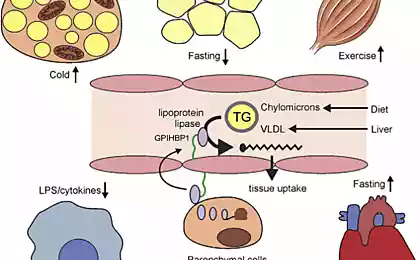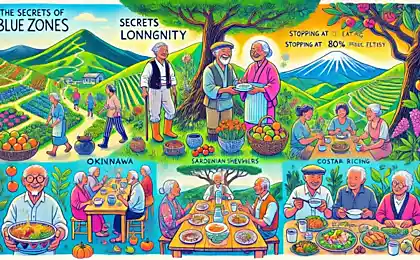199
The secrets of longevity: What 2023 Science Says About Nutrition and Lifestyle

Description: Learn how the latest scientific discoveries can help you live longer and healthier lives. Simple tips on nutrition, physical activity and mental health that are easy to implement in your life.
Introduction
Longevity is not just a gift of nature or luck. Modern science opens up more and more opportunities so that we can extend our lives and improve its quality. Studies in recent years, including significant discoveries in 2023, show that diet, physical activity and mental health play a key role in the aging process. In this article, we will look at what factors really contribute to longevity, and offer simple tips to help you incorporate this knowledge into your daily life. Our goal is not only to share the facts, but also to inspire you to make changes that will bring real benefits.
Food for longevity: What does science say?

Nutrition is the basis of health and longevity. In recent years, scientists are increasingly paying attention to how certain diets affect life expectancy. For example, the Mediterranean diet, rich in olive oil, fish, nuts and fresh vegetables, has repeatedly proven its effectiveness. A study published in the British Medical Journal (BMJ) found that a Mediterranean diet reduces the risk of cardiovascular disease by 25% and reduces the likelihood of developing dementia.
Another area of research is calorie restriction. Scientists from Nature Aging (Nature) found that reducing calorie intake by 15-20% can slow down the aging process at the cellular level. However, it is important not just to eat less, but to monitor the balance of nutrients. The body needs to get enough proteins, fats and carbohydrates to maintain health.
How to eat right for longevity?
Based on scientific data, several key recommendations can be identified:
- Squirrels: Give preference to low-fat sources such as fish, chicken, tofu and legumes. Vegetable proteins are especially useful as they contain less saturated fat.
- Fats: Choose unsaturated fats, such as olive oil, avocados and nuts. Omega-3 fatty acids found in fish help reduce inflammation in the body.
- Carbohydrate: Focus on complex carbohydrates such as whole grain foods, vegetables, and fruits. They provide stable blood sugar levels and prevent sharp spikes in insulin.
- Antioxidants: Include foods rich in antioxidants, such as berries, dark chocolate and green tea. They protect cells from damage caused by free radicals.
Physical activity: Movement is life.

Physical activity is another key factor in longevity. The World Health Organization recommends that adults engage in moderate physical activity for at least 150 minutes a week. A Harvard University study found that people who follow these guidelines live an average of 7 years longer than those who lead a sedentary lifestyle.
Physical activity not only improves heart and lung function, but also helps maintain muscle mass, bone density and cognitive function. For example, a study published in The Lancet (The Lancet) found that regular exercise reduced the risk of developing Alzheimer’s by 40%.
Which exercises to choose?
It is not necessary to register in the gym or become a professional athlete. Here are some simple and effective activities:
- Aerobic exercise: Brisk walking, running, swimming or cycling improves cardiovascular function.
- Strength training: Exercise with your own weight or dumbbells helps maintain muscle mass, which is especially important with age.
- Yoga and Pilates: These practices improve flexibility, balance and reduce the risk of falls.
Mental health: The role of the psyche in longevity
Mental well-being is not just a pleasant addition to physical health, but an integral part of longevity. Chronic stress, depression and anxiety can accelerate the aging process and increase the risk of chronic diseases. A Stanford University study found that regular mindfulness and meditation practices can slow brain aging and improve cognitive function.
Social networks also play an important role. A study published in The Lancet found that people with strong social connections live longer and suffer less from dementia. Maintain relationships with family and friends, participate in social life – it is not only pleasant, but also good for health.
How to maintain mental health?
Here are some tips to help you take care of your mental well-being:
- Practice meditation.: Even 10 minutes a day can help reduce stress and improve concentration.
- Do what you love.: Hobbies, reading, painting, or gardening – anything that brings joy helps reduce anxiety.
- Maintain social ties: Communicate regularly with loved ones, make new acquaintances, participate in volunteer projects.
- Call for help.: If you feel that you are not coping, do not hesitate to contact a psychologist or therapist.
Practical tips for everyday life
To implement this knowledge in your life, you do not need radical changes. Here are some simple steps you can start taking today:
- Eat diversely: Include in the diet more fruits, vegetables, nuts and whole grain products. Try to cook food at home to control the quality of the ingredients.
- Move every day.: Find the type of activity you like and give it at least 30 minutes a day. It can be a walk, yoga or dancing.
- Take time for yourself.: Practice meditation, read books, engage in hobbies – anything that brings you joy and helps you relax.
- Maintain social ties: Regularly communicate with loved ones, make new acquaintances, participate in public life.
- Watch your sleep.Quality sleep lasting 7-9 hours a day is necessary for the recovery of the body and maintaining mental health.
Conclusion
Longevity is not a myth, but an achievable goal if you follow simple but scientifically based recommendations. Nutrition, physical activity, and mental health are the three pillars that sustain a long and happy life. Science continues to open new horizons, but today we can use this knowledge to improve our health and quality of life. Start small and you will see your life changing for the better. Remember: taking care of yourself is not a luxury, but a necessity.
Glossary
Mediterranean dietDiet based on the traditional diet of the Mediterranean countries, including many vegetables, fruits, olive oil and fish.
Calorie restriction: Reducing calorie intake without compromising the nutritional value of food, aimed at slowing down the aging process.
mindfulness: Mindfulness practice aimed at total immersion in the moment and reducing stress levels.
AntioxidantsSubstances that protect cells from damage caused by free radicals, slowing down the aging process.
Aerobic exercise: Physical activity aimed at improving heart and lung function, such as running, swimming or walking.























